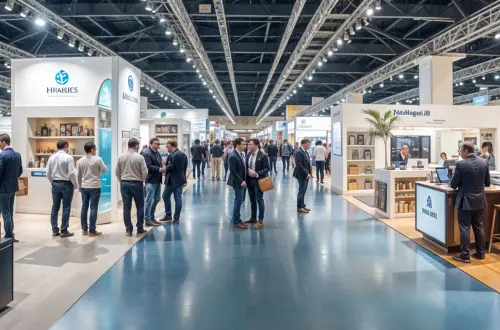Techtextil Frankfurt 2022– The Textile Industry's Exceptional Triple Restart!
Techtextil Frankfurt, Texprocess, and Heimtextil Summer Special 2022 marked the successful restart of the global textile industry. Between 21.06.2022 and 24.06.2022, the events were held in a hybrid form. The renditions featured many highlights and the central theme of sustainability. Around 63,000 visitors and 2,300 exhibitors from 117 nations attended.
Organisers hosted the three international textile trade fairs as hybrid events. They comprised face-to-face trade fairs hosted in Messe Frankfurt, complemented by Digital Extensions. The Extensions allowed attendees to visit in remote form and were available until 08.07.2022. Messe Frankfurt did not feature strict Covid-19 safety measures for the live aspects. This was because of the removal of the related national restrictions. Many of the safety measures became voluntary steps.
The trade fairs featured sustainability as the central theme. They featured the key topic through various means. Among them were the Sustainability Areas. The exhibitors in these areas presented innovations like progressive fibres. They also displayed novel processes, cutting technologies, processing equipment, and water-conserving dyeing procedures.
The three international textile fairs featured various highlights. This included the opening press conference ”Pioneering impulses in challenging times”. It discussed several topics. Among them was the role collaborations have in developing innovations. The subjects further included the increasing importance of sustainability for the sector. Speakers discussed these including:
- Lucie Brigham
- Matthew Drinkwater
- Elgar Straub
- Olaf Schmidt
Moderating the discussion was Alexandra Bohn.
Lucie Brigham discussed the importance of collaborations in determining sustainable market opportunities. Matthew Drinkwater discussed how the latest digital developments redefine design processes. Elgar Straub emphasised the increasing demands placed upon sewing and apparel technology manufacturers. He also noted how increasing the focus on regional production can improve transparency.
One of the notable highlights was the Denim Future Lab in Hall 8.0. It allowed attendees to examine the whole denim production and processing value chain. This includes exploring trends such as eco-denim through a series of live demonstrations. Such topics were discussed in the Denim Future Lab’s Speaker Corner. It included speakers from companies such as Brongo, Ugolini, Wiser Tech, and Jeanologia. They discussed subjects such as eco-bleaching, eco-dyeing, custom design and finished luxury denim.
Attendees could once again attend the Techtextil and Texprocess Forums. These are the leading sub-events for gaining specialist knowledge and were held on all four days. They provided detailed data on various topics, including the newest trends and approaches. The programmes featured presentations such as “Where should the data for sustainability be derived from?”. The presentations were available on-site as well as on-demand on the Digital Extensions. Each Forum focused on topics related to specific aspects of the value chain. For example, the Techtextil Forum in Hall 9.1 focused on technical textiles and nonwovens. It featured topics such as “Developing 3D-printed composite elements for stab protective clothes”. The Texprocess Forum focused on processing subjects, such as Impact 4.0.
A notable highlight was the special show “Performance Textiles in Fashion”. It presented innovative garments and textile end products for a variety of industries. Among the exhibitors presented at the sub-event was Sitip. They displayed their warp-knitted white shirt from the COSMOPOLITAN Fashion-tech fabric collection. The fabric is created from a 4-way stretchable, quick-drying, comfortable, nonrestrictive and fitting material. Complementing the shirt were pants and jacket produced from 4-way stretch nylon. The fabric features high performance, breathability, comfort, fitting, and insulation levels.
One of the most expected highlights was the Techtextil and Texprocess Innovation Awards. They lauded the textile innovations that will further the development of the industry. Two international expert groups select each winner. They are presented on all four days of the events in Hall 9.1 or Hall 9.0. The public presentation of the Award occurred on 21.06.2022 in Hall 9.0.
Nine participants received the Techtextil Innovation Award. In the “New Product” category, the prize was granted to ITM and its cooperation partners. It developed the world’s first woven heart valve that does not need joining techniques. For children with heart valve defects, this can be beneficial. This is due to the innovation growing with the young patient's heart. This avoids repetitive surgical interventions. The “New Material” category prize was granted to RBX Creations. They received it for their innovative cellulose fibre created from hemp waste. They produce the novel ware via a novel extraction process that uses oilseed hemp waste. The “New Technology” winners included Fibrecoat GmbH and Deutsche Basalt Faser GmbH. They were lauded for their aluminium-coated basalt fibre. The innovation blends the strength of basalt with aluminium electrical conductivity. This enables the creation of an alternative material that reduces electromagnetic shielding costs. Likewise, it can be used as an alternative shielding material in electric cars.
The"New Concept" winners included Kelheim Fibres GmbH. They earned the prize for their novel cellulose-based thermally-bonded nonwoven products. The wares are invaluable for reusable products with high absorbency rates. One of the “New Approaches on Sustainability & Circular Economy” winners was CITEVE. They earned acclaim for the innovative use of automotive natural leather waste. This results in a symbiosis, which reduces the amount of generated waste materials. The same category also featured a third winner, Centexbel. They received recognition for their bio-based compostable non-solvent-using textiles coating solution. This reduces the number of materials used for textile coatings and printing inks. It also introduces a new type of polymer.
The “Performance Fashion Award” prize was granted to Verabuccia, a young Italian label. They received acclaim for their fruit-waste-conversion process. The procedure keeps the original appearance of the material. OrganoClick received recognition in the “New Technology” category. This is due to their 100% bio-based nonwoven application compostable binder. It is created from waste components such as wheat bran, fruit or crab shells. It substitutes plastic-based binders. “New Approaches on Sustainability & Circular Economy” also featured a third winner. This was the German Institute for Textile and Fibre Research Denkendorf. They received a prize for their novel and formaldehyde-free coating system. It uses non-toxic hydroxymethylfurfural (HMF) created from biomass waste. The dip formulations substitute formaldehyde-based adhesion promoters on a 1-to-1 basis. This can be useful for products such as tires, V-belts, or conveyor belts. This is due to the formulations replacing reinforcements used to strengthen rubber materials. In such materials, the performance quality depends on the fibre’s adhesion properties. The innovation removes the need to use carcinogen and mutagen-proven promoters.
The jury granted the Texprocess Innovation Award to four winners. These included Ventron Typical Europe GmbH for their cold-glueing robot. It can perform a fully automated sealing of seams on the reverse side. This allows the technology to be used in combination with high-demanding process automation. Examples include the processes used in the automotive industry. The second winner was ZSK Stickmaschinen GmbH. They earned acclaim for their novel single- and multi-head embroidery machine head. The “R-head”, as the novel ware is known, archives speeds of up to 2,000 stitches per minute. This promotes higher productivity rates while maintaining excellent precision and reliability rates. It also reduces noise emissions and enables manual replacement by the users.
The third winner was Juki Central Europe. This is due to their AW-3S automatic bobbin thread winding and feeding device. It calculates the amount of bobbin thread needed to complete a pattern. It also changes the sewing thread based on manufacturer specifics. This enhances productivity and reduces sewing machine operator fatigue. As a result, operators can focus on quality control and production. The fourth winner was Dürkopp Adler for their software module "QONDAC Guided Working". It connects the production staff and the programmable sewing machines by supporting processes. Also, the ware can aid manual workstations or conventional sewing machines. It can do so by integrating them into the network.
Techtextil and Texprocess coincided with the Heimtextil Summer Special. Such a coincidence took place due to the Covid-19 pandemic. This allowed attendees to overview the full spectrum of the industry. Heimtextil Summer Special featured several highlights. Among them were the Heimtextil Trends. Another highlight was the Heimtextil Conference, “Sleep & More”. It discussed the latest sleep research results and hotel industry sustainability approaches. Like Techtextil Frankfurt and Texprocess, Heimtextil Summer Special also focused on sustainability.
The three trade fairs marked the successful restart of the global textile industry. They received approximately 63,000 visitors and 2,300 exhibitors from 117 countries. The visitor nations with the highest numbers were:
|
|
|
All three events achieved their pre-pandemic levels of internationality. High visitor satisfaction and quality were also at high levels. 91% of the visitors stated they were pleased with their attendance. Among the contributing factors were the opportunities for intensive live discussions. They further included personal exchanges and spontaneous cooperation. Additionally, the contributors to the success incorporated the chance for cross-networking.


